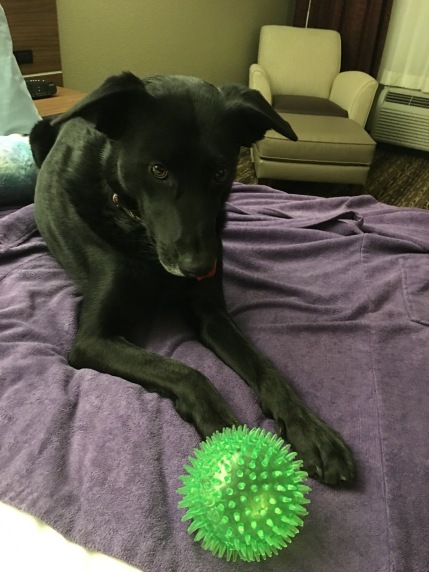I miss my grandmother (Vina Jewell Burhenn – Isn’t her name the GREATEST?). As I stopped to think about how to approach my subject for Hearing Elmo this week, I found myself thinking of a very special memory.
It was always a treat to sit with my grandparents in church on Sunday. I think I convinced myself that Grandma would let me get away with more, and my mom and dad were going to make me be “super good”. The pastor was my uncle, Cecil, and so even as a little kid we were expected to be an example to other little kids in the church because we were “kin”. So whenever possible, I always sat with Grandma because I could get away with more – AND… she always gave me a 1/2 stick of Juicy Fruit gum.
Naive kiddo that I was, the truth was that Grandma made me be even more “golden” and because we sat three rows from the front, my parents sitting behind – and to the right of us – could STILL see everything I did.
In the earliest years, I don’t think I ever questioned, “why a HALF stick of Juicy Fruit gum?” I will have to hazard a guess that around 8 or 9 years old, I finally whispered and asked Grandma, “why a HALF stick?”
“When you break it in half, does it let the magic pour out?” I whispered.
Response: Blank Stare
“When you break it in half, is it teaching me to share?” I queried.
Response: Blank Stare
“When you break it in half, is it to make sure I come back for the other half?” I said softly, and with strategic wisdom.
Response: “Denise, I gave you a half a stick because it is ENOUGH”.
Oh. Well gee. I know my child-brain kinda hated the logic of that.
My grandmother would dole out half sticks of Juicy Fruit gum because it was ENOUGH. (Side note: What a shame that it was never Doublemint gum as I would have discovered at an earlier age that I was allergic to spearmint).
It Simply Doesn’t Take MUCh to be ENOUGH
I’m told I take after my grandmother in a lot of ways. Here are just a few FREQUENT reminders from siblings and parents:
- I doctor my own ailments to my detriment. And I have Google, which Grandma did not!
- I love animals – many times more than people.
- I expect justice and fairness.
- I will respect you, but by golly you better reciprocate. If you don’t we’re gonna argue!
- I can be stubborn.
- I don’t mind confrontation. (Likely only recently doing confrontation in the right way).
I think one of the things I get down about the most as a person who is differently-abled with a chronic illness, is that I often worry and fret about my limitations.
I can’t hear on the phone so I am not able to easily call up a friend and ask how they are doing.
I can’t see to drive at night (headlights trigger vertigo), so I cannot go to parties, meet-ups, etc. with friends at night. Most folks do stuff later in the day.
I can’t just drop everything and go to a friend’s rescue. My own limitations require that I determine if I’m physically ABLE. I must ready my canine partner, Milo. I am not a 9-1-1 friend. That grieves me.
You may have limitations that at times, cause you to feel as if what you have to offer is not as valuable. You see how other friends reach out to each other and are discouraged that you cannot offer the same kind of friendship. (If you’ve never read “Spoons” – you should. It eloquently describes life as a differently-abled person). You can only offer a HALF stick of Juicy Fruit gum and you are a little bit pissed off by that.
Do you know what I have learned? A half a stick of Juicy Fruit is enough. I may only be able to touch base with friends via text or Facebook, but taking the time to touch base is STILL appreciated. I may not be able to go to things at night, but when my daytime schedule allows, I can drop off a meal or come by for a quick hug. I cannot be a 9-1-1 friend and be able to just physically show up at an emergency. However, my friends know they can text me or private message me and I will drop EVERYTHING to pray, encourage, and be there for them.
“The purpose of life is not to be happy. It is to be useful, to be honorable, to be compassionate, to have it make some difference that you have lived and lived well.”
― Ralph Waldo Emerson
We want to make a difference. We want people to see our value. We need to be needed. We all strive for that purpose in different ways.
Maybe you are passionate about social justice issues and do all you are capable of doing.
Perhaps you are a writer – and do so to encourage, educate, and advocate.
Maybe you are an artist. Your drawings, photos, paintings, and sculptures reach out and change people.
You follow up with hurting people and ask them how they are doing NOW.
Your HALF stick of Juicy Fruit is pretty darn important. What you CAN do… what you are able to do… is ENOUGH.
Don’t let anyone tell you anything differently. If they do, give them my number and I’ll take care of it. <wink>
You have value. Believe.
Denise Portis
©2017 Personal Hearing Loss Journal







